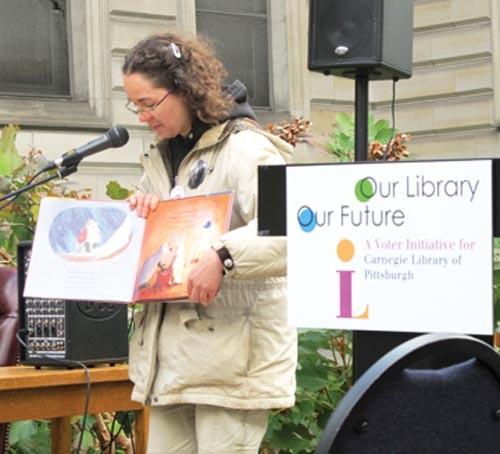Browsing through children's books at the Downtown branch of the Carnegie Library, Diana Fondren fondly remembers taking her daughter to the Oakland library when she was a young girl.
"She would take out 30 books at a time," recalls Fondren, 55, of Beltzhoover, whose daughter is now a 24-year-old English major at the University of Pittsburgh. "The library was vital in her life.
"If I had a million dollars, I'd give it to the library."
Fondren doesn't have a million dollars. But she's one of many Carnegie Library supporters urging Pittsburgh voters to approve an Election Day ballot referendum that would raise property taxes to help fund the financially strapped library system.
"Vote yes," Fondren says. "You can't live without libraries."
On Nov. 8, voters will be asked to vote "yes" or "no" on a referendum to institute a 0.25 mill special tax on taxable real estate -- the equivalent of about $25 per year, or $2.09 a month, on a property worth $100,000. The funds generated by the tax would be earmarked solely for the operation and maintenance of the Carnegie Library system, which has suffered from dwindling state funding in recent years.
"It's a very, very small ask for a huge return," says Pittsburgh City Councilor Bruce Kraus, who serves as a Carnegie Library board member. "Libraries don't just magically exist. They take funding."
In July, members of the library activist group Our Library, Our Future presented city council with nearly 11,000 petition signatures -- they needed only 2,769 -- asking for the question to appear on the November ballot. Since then, library supporters have tried to raise awareness about the referendum, knocking on doors, making phone calls and organizing events like the 24-hour "Read to the People" read-aloud held Oct. 14-15 on the steps of the main Carnegie Library in Oakland.
"Little kids are doing lemonade stands" to raise awareness about the ballot initiative, says Kraus. "It's an amazing effort."
Much needed, too.
In recent years, financial woes have plagued Carnegie Library. Mary Frances Cooper, the library's deputy director, says funding from the Regional Asset District -- the library system's primary funder -- has held steady in recent years, but there haven't been many increases. State funding, meanwhile, has decreased by about $2 million over the past couple of years.
The funding situation looked so dire in 2009 that the library system proposed closing five of its 19 branches to help reduce a $1.2 million budget deficit. The library's board of trustees later nixed the plan after strong public outcry and some short-term financial aid from the city.
The ballot referendum is just one of six fundraising initiatives produced by the Public-Private Task Force on Sustainable Library Funding, which in January unanimously approved a plan to help raise $5 million to $6 million annually. While the ballot referendum represents the biggest part of the plan -- it's expected to raise about $3.5 million per year -- it also calls for measures such as building the Carnegie Library's endowment and increasing fundraising and corporate contributions.
"We didn't want the public to think we were turning to taxpayers for all of the solutions to the library's problems," says Common Pleas Judge Frank Lucchino, co-chair of the funding committee. "We've made this a very modest increase -- $2.09 a month. A cup of coffee at Starbucks probably costs that much."
Lucchino says he's "cautiously optimistic" that the referendum will pass. While he is convinced that people "care a lot about their libraries," as evidenced by their outrage about the proposed branch closings, he understands that "people have a very negative reaction to any kind of increase in taxes."
Even Mayor Luke Ravenstahl, who signed the petitions to put the measure on the ballot, has said he will not vote for the referendum because, according to his spokesperson, "he believes the people of Pittsburgh already pay too much in property tax."
But other public officials, like Kraus, are confident that the measure will pass. And like Fondren, his message to Pittsburgh voters is short and sweet: "Please vote yes."















